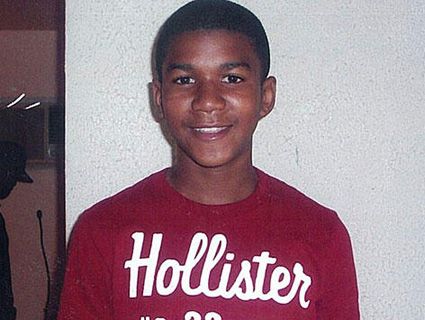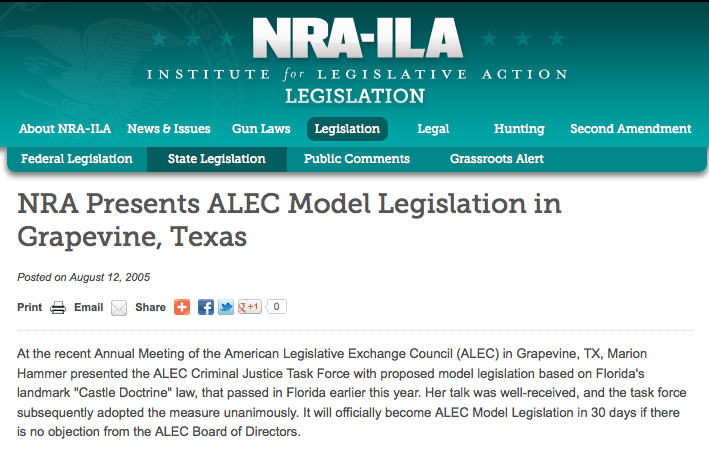Submitted by Brendan Fischer on
 A Florida law that may protect the man who shot and killed 17-year-old Trayvon Martin in February is the template for an American Legislative Exchange Council (ALEC) "model bill" that has been pushed in other states. The bill was brought to ALEC by the National Rifle Association (NRA), and fits into a pattern of ALEC bills that disproportionately impact communities of color.
A Florida law that may protect the man who shot and killed 17-year-old Trayvon Martin in February is the template for an American Legislative Exchange Council (ALEC) "model bill" that has been pushed in other states. The bill was brought to ALEC by the National Rifle Association (NRA), and fits into a pattern of ALEC bills that disproportionately impact communities of color.
Florida's "stand your ground," or "castle doctrine," law could prevent the prosecution of George Zimmerman, the 28-year-old "neighborhood watch" vigilante who shot the unarmed Martin as the teen returned from a trip to 7-11 with an iced tea and a pack of Skittles. The law, also pushed by its supporters under the name the "Castle Doctrine," changes state criminal justice and civil law codes by giving legal immunity to a person who uses "deadly force if he or she reasonably believes it is necessary to do so to prevent death or great bodily harm to himself or herself or another or to prevent the commission of a forcible felony." It also bars the deceased's family from bringing a civil suit.
Evidence suggests a major reason Zimmerman thought he needed to use deadly force against the unarmed Martin is because the teen was black -- on the recording of Zimmerman's call to 911 (which he made before pursuing the teen), he is heard using what sounds like a racial epithet and saying "he's a black male...Something's wrong with him...These a**holes, they always get away." Zimmerman has not been charged with any crime.
As Media Matters reported earlier, Florida's "stand your ground" law is nearly identical to the ALEC Castle Doctrine Act.
From the Florida law:
(3) A person who is not engaged in an unlawful activity and who is attacked in any other place where he or she has a right to be has no duty to retreat and has the right to stand his or her ground and meet force with force, including deadly force if he or she reasonably believes it is necessary to do so to prevent death or great bodily harm to himself or herself or another or to prevent the commission of a forcible felony.
And from the ALEC model:
(3) A person who is not engaged in an unlawful activity and who is attacked in any other place where he or she has a right to be has no duty to retreat and has the right to stand his or her ground and meet force with force, including deadly force if he or she reasonably believes it is necessary to do so to prevent death or great bodily harm to himself or herself or another, or to prevent the commission of a forcible felony.
ALEC is the corporate-funded organization that allows global corporations like Wal-Mart and ideological special interests like the NRA to hand state legislators changes to the laws they desire. ALEC “model bills” have served as the template for voter ID laws that swept the country in 2011, for the “voucher” programs that privatize education, for anti-environmental deregulatory bills, and for the wave of anti-union legislation in Wisconsin, Ohio, and Indiana.
 The NRA and its lobbyist Marion Hammer helped draft the "stand your ground" law and first pushed it in Florida. Florida Senator Durell Peaden, an ALEC member, introduced the law in his state and it passed in early 2005 as the NRA's Hammer reportedly "stared down legislators as they voted." After Governor Jeb Bush signed it into law, Hammer presented the bill to ALEC's Criminal Justice Task Force (now known as the Public Safety and Elections Task Force) months later.
The NRA and its lobbyist Marion Hammer helped draft the "stand your ground" law and first pushed it in Florida. Florida Senator Durell Peaden, an ALEC member, introduced the law in his state and it passed in early 2005 as the NRA's Hammer reportedly "stared down legislators as they voted." After Governor Jeb Bush signed it into law, Hammer presented the bill to ALEC's Criminal Justice Task Force (now known as the Public Safety and Elections Task Force) months later.
As the Center for Media and Democracy has uncovered, the NRA boasted that "[h]er talk was well-received," and the corporations and state legislators on the Task Force voted unanimously to approve the bill as an ALEC model. As CMD and Common Cause have noted, ALEC Task Force meetings are closed to the press and public, but corporations and ideological special interests or trade groups like the NRA vote as equals with elected officials. At the time, as CMD has documented, Wal-Mart was the corporate co-chair of the Task Force (see the screenshot here). Since becoming an ALEC model, 16 states have passed laws that contain provisions identical or similar to the ALEC "Castle Doctrine Act." In 2007 it was passed in four states and highlighted by ALEC on their "legislative scorecard," as discovered by Common Cause.
In 2011, controversial governor and ALEC alum Scott Walker signed into law in Wisconsin a Castle Doctrine bill that echoes the ALEC bill in key elements. On March 3 of this year, 20-year-old college student Bo Morrison was shot and killed by a homeowner in Slinger, Wisconsin as the young man hid from police after attending an underage drinking party. Because of the Castle Doctrine, no charges will be filed in the shooting. Like Trayvon Martin, Bo Morrison was black.
Codifying Racial Bias
"The 'Stand Your Ground' law is a license to kill," former U.S. attorney Kendall Coffey told NBC News, noting that the number of "justifiable homicides" in Florida has tripled since the law was passed in 2005.
The Castle Doctrine and its "stand your ground" provisions give license for people to engage in vigilantism without liability. As such, the ALEC bill can put the decision to take a life in the hands of a person whose fears are motivated by prejudice and racial bias. The law establishes a presumption that a person acted in self-defense if a killer claims they had a reasonable fear of bodily harm, but in situations like the killing of Trayvon Martin, where there were few eyewitnesses other than the alleged killer and the person who is killed, the presumption of immunity can be very difficult to rebut. In those circumstances, unfounded fear based on racial prejudice that leads to murder could end up being protected under the law.
If the ALEC "Castle Doctrine Act" opens the door for racial bias to be protected under the criminal justice system, the ALEC model "Voter ID Act" may sanction racial prejudice in the electoral system.
 The ALEC "Voter ID Act" would require voters show only certain kinds of photo IDs at the polls, which could potentially disenfranchise millions of people who do not have the required photo ID but who have proof of identity and residency -- primarily people of color, the poor, and the elderly. A study from the Brennan Center found approximately 5 million people nationally do not have the state-issued IDs that the new laws require to vote. In Wisconsin, around 220,000 eligible voters lack ID, with around half of all African-Americans and Latinos and a quarter of all elderly citizens not having a driver's license.
The ALEC "Voter ID Act" would require voters show only certain kinds of photo IDs at the polls, which could potentially disenfranchise millions of people who do not have the required photo ID but who have proof of identity and residency -- primarily people of color, the poor, and the elderly. A study from the Brennan Center found approximately 5 million people nationally do not have the state-issued IDs that the new laws require to vote. In Wisconsin, around 220,000 eligible voters lack ID, with around half of all African-Americans and Latinos and a quarter of all elderly citizens not having a driver's license.
"The heart of the modern block the vote campaign is a wave of restrictive government-issued photo identification requirements," states a December report from the NAACP. "In a coordinated effort, legislators in thirty-four states introduced bills imposing such requirements. Many of these bills were modeled on legislation," the report notes, approved by corporations and politicians through the "American Legislative Exchange Council (ALEC)—a conservative advocacy group whose founder explained: 'our leverage in the elections quite candidly goes up as the voting populace goes down.'"
ALEC Meetings Not Representative
While some ALEC bills disproportionately affect communities of color, it may be little surprise that African-Americans and Latinos are mostly absent at ALEC meetings. The 2011 ALEC meeting in New Orleans was overwhelmingly white based on the observations of those attending. But the lack of representation is striking for an organization purportedly concerned with giving a voice to those affected by government action.
After the Center for Media and Democracy analyzed and made available over 800 previously-secret ALEC "model bills" in July, ALEC's National Chair, Louisiana Rep. Noble Ellington, spoke with NPR's Terry Gross about the organization. Gross asked Ellington, "Why give corporations such a big say in drafting legislation?" Ellington replied, "Well, partly because they're one of the ones who will be affected by it."
While corporations may have had a say in drafting legislation, people representing populations most affected by ALEC model bills -- like communities of color -- were not in the closed-door meetings where politicians vote as equals with lobbyists. But some are raising their voices -- Color of Change has launched a campaign encouraging corporations that rely on business from African-Americans to stop funding the American Legislative Exchange Council (ALEC) through corporate membership dues.
The Color of Change ALEC petition is available here. The group's petition demanding justice for Trayvon Martin is available here.
CMD's Executive Director Lisa Graves and Nick Surgey of Common Cause contributed research to this article. Please note the additional file attachments below.
* This article was updated with the March 27 Media Matters report, where Hammer admitted to helping draft the law.
| Attachment | Size |
|---|---|
| 121.49 KB | |
| 174.58 KB | |
| 157.9 KB |

Comments
samsezoh replied on Permalink
Are these numbers real?
Brendan Fischer replied on Permalink
I appreciate your thorough
sukie11 replied on Permalink
trayvon's photo
grampajim replied on Permalink
Mr Zimmerman
Pages